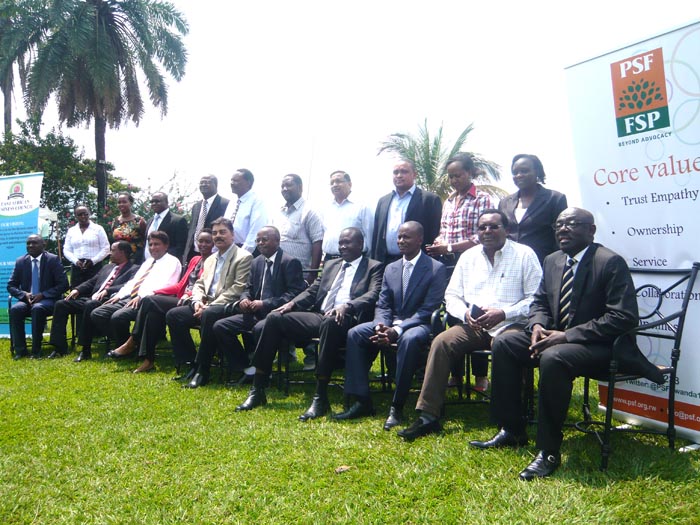The 56th Executive Committee of East African Business Council (EABC ) has just concluded this last week a Strategic Board Retreat in Rwanda whose objective was to steer EABC into a new direction in 2014 and beyond.-By Diane Uwimana
Achieving its mission of being the driver of policy advocacy in the EAC Region and ensuring better service delivery to its membership, the EABC Executive Committee convened to some key recommendations for strengthening and deepening the business in EAC region during a retreat held in Rwanda, last week. Econie Nijimbere, the Deputy President of East African Business Council EABC and Chairperson of Burundi Federal Chamber of Trade and Industry (CFCIB) indicates that the Executive Committee resolved to present the concerns of EAC businesses to all the five Heads of State in the region. “EABC will in the first quarter of 2014 holds high level meetings with each of the Presidents of Burundi, Kenya, Rwanda, Tanzania and Uganda to articulate the issues affecting businesses across the region among them. The Council will also invite high Commissioners and Ambassadors of EAC countries in the Partner States”, points out Nijimbere. Then, there are some issues which are going to be addressed. Firstly, the EAC governments have to expedite the use of IDs as a travel document in the entire region. Kenya, Uganda and Rwanda have already started allowing citizens of the three countries to use the ID as a travel document. “At this point, the EABC will be requesting Tanzania and Burundi to do the same to allow easy movement of traders and EAC citizens across the region”, explains the Deputy Chairman of EABC. Secondly, advocating for the reduction of the cost of air transport to ensure easy movement of business people and citizens across the region so that Intra-EAC trade can increase and expand. Moreover, reducing the cost of telecommunications in the region to cut down the cost of doing business will also be focused on. Next, urging the Partner States to adopt the EAC Single Tourist Visa to increase the flow of tourists to the region and resolve all issues affecting the tourism sector given that this sector contributes immensely to the GDP of the five countries. “Harmonizing the Visa fees requirements across the EAC will be a big important thing in the region,” underlines Nijimbere. “Improvement of some infrastructure” Partner States should set a specific date for coming into Force of the Agreement to avoid double taxation. Four countries (Kenya, Uganda, Tanzania and Burundi) except Rwanda have not ratified the Agreement for double taxation avoidance. Econie Nijimbere underlines that during the retreat there are other issues to be pursued including improving the functionality of the ports of Mombasa and Dar es Salaam, delinking the schedule of movement of workers from the schedule of movement of services under the Common Market protocol and ratification of the agreement of avoidance of double taxation among other issues. EABC will be holding meetings with the Secretary General and the Ministries of EAC affairs across the region to ensure that the private sector is invited and fully informed and involved in the activities and decision- making process. During the retreat, the EABC Board of Directors also resolved to strengthen the EABC Secretariat to be able to serve the members better through capacity building and stationing of Technical Liaison officers in each of the five Partner States to ensure quick and regular service delivery to members. The 56th Executive Committee has engaged to increase EABC visibility through the media, website, East Africa Business agenda and social media. Going forward, EABC has strategically positioned itself to be the driver of policy advocacy in the EAC Region and influence policy decisions at regional level and ensure that implementation of agreed decisions at national level are expedited.




















 IWACU Open Data
IWACU Open Data

